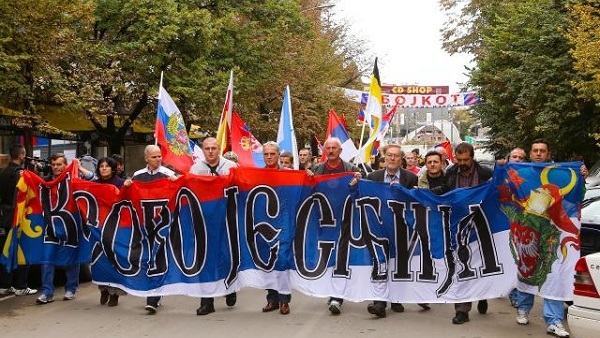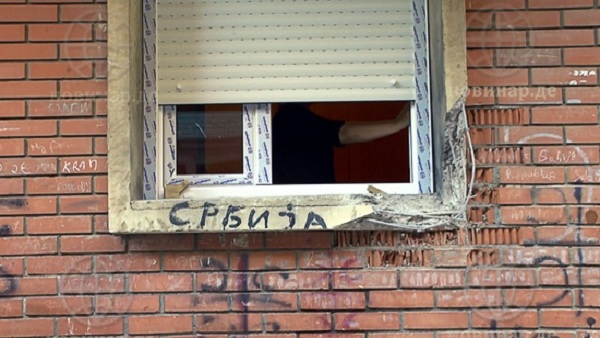| source: kurir-info.rs |
I won't discuss the legality or the legitimacy of this paper and its adoption process, because there is none outside that overarching principle hiding behind any political demagoguery: "might makes right."
What is important to talk about at the time when all sides to the story but one have accepted that the piece of paper initialed by Serbia's prime minister is the law of the land, however illegal and illegitimate, are the methods of coercion the resilient community of North Kosovo is being subjected to by their own government, its Kosovan counterpart and the Albanian population.
The Serbian participation in the November 3 election legitimizes Kosovo's existence as an "independent" country. (Kosovo, in reality, is a territory occupied by NATO and the EU, and the formal independence from Serbia does not make it any more truly independent than Guam.)
Thaci and his imperial overlords need this; without the recognition/capitulation of Serbia and the local Serbs, their imperial conquest can only live a life of a bastard.
Serbs in the North are the only Serbian community that had rejected Boris Tadic's calls to recognize the institutions of the Albanian Kosovo. The Dačić-Vučić-Nikolić trinity, however, has overridden Kosovo Serbs' political will and made a pact with Hashim Thaci's regime to coerce the community into subordination via back door, after Thaci's and NATO's frontal attacks failed numerous times.
 |
| source: srbinaokup.info |
Feeling the resistance and anticipating failure, both Belgrade and Priština have intensified pressure through subtle and not-so-subtle acts of coercion.
Explosions have been rocking North Mitrovica for weeks. Serbs continue being attacked by Albanian mobs - not only in the North - on a regular basis.
Most seriously, a conflict is being stirred between the minority of the Serbian population who is willing to go along with Belgrade's mandate and the majority who rejects the Albanian rule despite Belgrade's orders. It is unclear which incident fall into what category, but the very intensification is a clear sign that the pressure and tensions are rising and that they are related to Serbian community's unwillingness to sign its death sentence, i.e. to agree to a predicament that threatens its very existence on its ancestral land.
Lines of the conflict are now drawn not only between local Serbs on one side and Albanians, their government and their imperial occupiers on the other, but between pro-integration and pro-liberty Serbs.
The new puppet regime in Belgrade has achieved what neither the old regime nor the occupying military force could: it divided the North Kosovo Serbs to expedite their subordination into the rogue Albanian state of Kosovo.
On October 23, arson was reported in a North Mitrovica cafe. An explosion was reported in the same street on October 18.
 |
| source: srbinaokup.info |
Earlier that day, a bomb exploded on the balcony of a house belonging to an election candidate of the Civic Initiative "Srpska," the Belgrade-formed faction running for seats in the Kosovo legislature.
On October 14, Nebojša Marić, a local Serb leader who called for boycott of the elections, was reportedly injured when an explosive device blew up his bedroom window while he was sleeping.
On October 8, it was reported that Albanian mob burned the home of Slavomir Grubanović, a Serb returnee to the village of Belo Polje, near Peć. On the same day, another group crossed the bridge into North Mitrovica and stoned the former town hall building.
Of course, the response to these incidents from the occupying force of NATO and EULEX has been the usual one: a condemnation, if that, and the casual purported inability to find perpetrators.
Parallel and intertwined with the acts of violence against the Kosovo Serbs is the political charade ran by the official Belgrade.
Amidst the dog-and-pony show involving Dačić and Aleksandar Vulin, the special envoy, reportedly being banned from entering Kosovo, Aleksandar Vučić becoming an honorary citizen of the town of Leposavić, Thaci interchangeably thanking Belgrade for encouraging Serbs to vote and warning it not to get involved, the repeated warnings and threats issued by Belgrade officials, most specifically Vulin, to Serbs who called for boycott or decided to not adhere to the Belgrade-Priština agenda have been the most worthy of attention.
Vulin, a controversial personality with flip-flopping political character, like most of the key leaders of Serbia's puppet regime, has been campaigning intensively and enforcing the message that Kosovo Serbs must obey the Brussels Agreement or else.
Two juxtaposed instances show that Vulin is not kidding either.
 |
| source: b92.net |
On the other end, public sector employees of North Mitrovica, also on the payroll of Serbia, were expressly forbidden to walk in the anti-participation rally, organized by the Serb National Council of North Mitrovica on October 22.
The locally organized Interim Assembly of Autonomous Province of Kosovo and Metohija formed its Anti-election Staff in response to the intensified pressure from Belgrade.
Their position of non-compliance is based on the very reasonable forecast that Serbs will have to assimilate or be driven out by the Albanian if they integrate their communities into the rogue state and recognize Kosovo's legal system in any shape or form. They find the proposed "union of Serb municipalities," with its vague jurisdiction, not an adequate protection at all, considering the experience of most of other Serb communities in Kosovo that fell under Priština's rule.
The Anti-election Staff has recently accused official Belgrade of stirring conflict among the North Kosovo Serbs and artificially creating the atmosphere of distrust and fear among neighbors.
Patriotic commentators, both within and outside of Kosovo, have felt especially betrayed by the calls for compliance coming from key leaders of the Serbian Orthodox Church, including Patriarch Irinej himself. Based on reports and public statements of individuals and groups on patriotic portals, a lot of Kosovo Serbs feel that church leaders sided with Thaci and Dačić and against them in this ongoing conflict.
The Church, next to the people, has been the main pillar of Serbian presence in Kosovo and Metohija for centuries, but its current Kosovo agenda seem to be stuck between the philosophies of "addition by subtraction" and "go along to get along."
An increasing number of not only Kosovo Serbs is vocal about the support for the disgraced and removed Bishop Artemije, who they saw as the most genuine advocate for Serbian interests and rights in the occupied territory.
All in all, the November 3 election threatens to seal the fate of the semi-free Serb communities in Kosovo. However low the turnout gets to be, Belgrade, Priština and Brussels are likely to ignore it and declare victory and legitimacy of the outcome, thus shutting the door on any presence of the Republic of Serbia in its occupied province and basically throwing the local Serbs to the wolves. Rumors of loads of ballots with fake voter identities being shipped into Kosovo are rampant. Having direct experience with how easily and regularly democratic process is manipulated, I'm significantly more inclined to believe the rumors than to disregard them.
Whatever the way, the outcome will legitimize the secession and occupation of the Serbian province and it will veil Serbian regime's unconstitutional and unpatriotic acts, which many a Serb considers a treason, in the readily touted ''consent'' of the people.
No comments:
Post a Comment